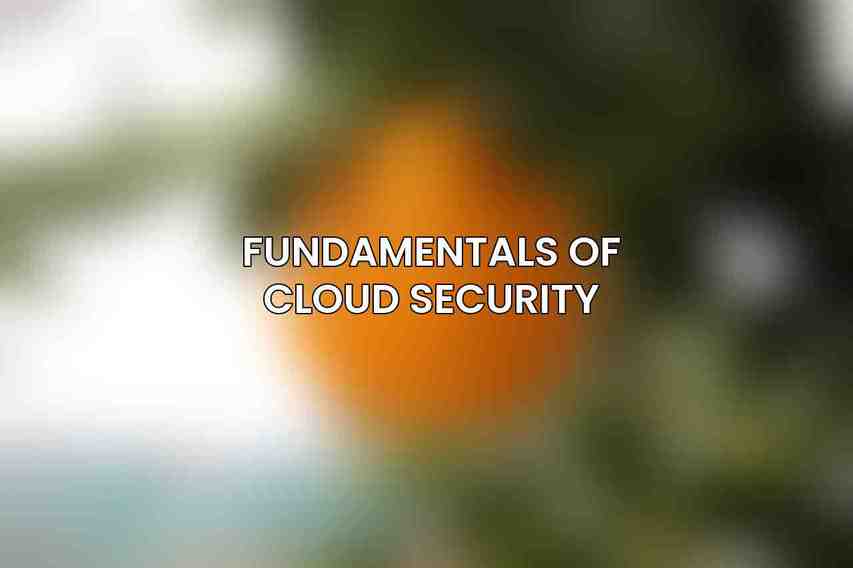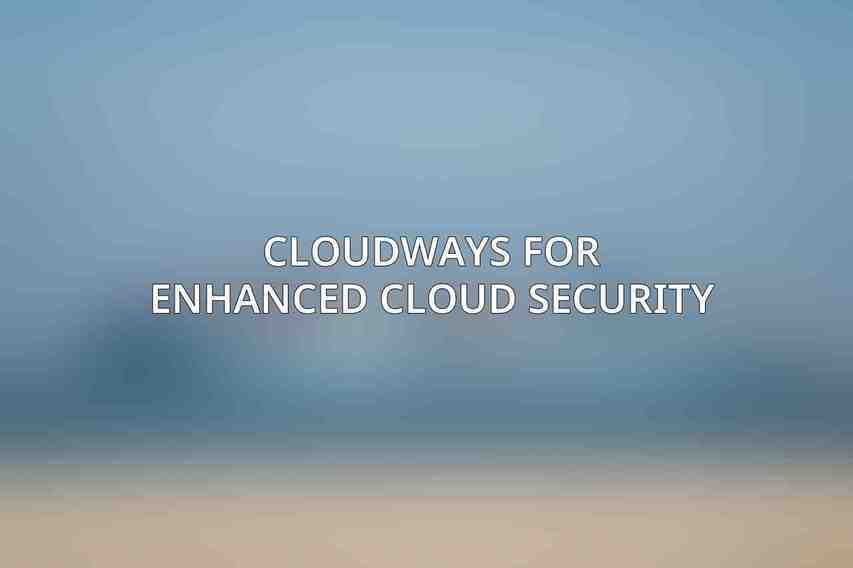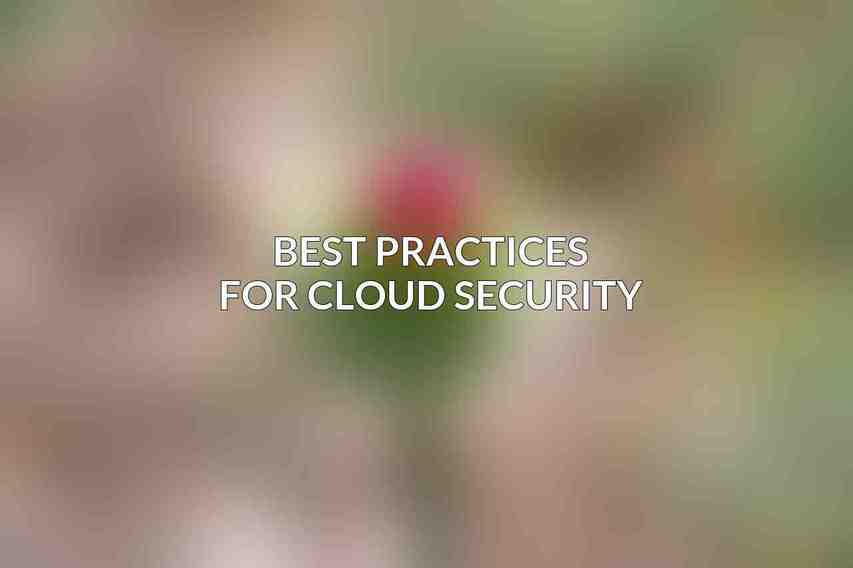Cloud security is a crucial aspect of modern IT infrastructure, focusing on safeguarding data, applications, and networks hosted in cloud environments. The significance of cloud security lies in ensuring confidentiality, integrity, and availability of resources stored in the cloud. As organizations increasingly rely on cloud services for data storage and processing, maintaining robust security measures becomes paramount to protect against cyber threats and unauthorized access.
The shared responsibility model in cloud computing defines the division of security responsibilities between cloud service providers and cloud users. While the cloud provider is responsible for securing the infrastructure layer, users are accountable for securing their data and configuring access controls. This collaborative approach emphasizes the importance of understanding and implementing security measures at both ends to create a comprehensive defense strategy.
Security threats and vulnerabilities in cloud environments pose significant risks to data confidentiality and system integrity. Common threats include data breaches, account hijacking, insecure APIs, and malware infections. Understanding these risks is essential for designing effective security protocols and implementing preventive measures to mitigate potential vulnerabilities before they are exploited by malicious actors.
| Feature | Description | ||||||||||||||||||||||||||||||||||||||||||||||||||||||||||||||||||||||||||||||||||||||||||||||||||
|---|---|---|---|---|---|---|---|---|---|---|---|---|---|---|---|---|---|---|---|---|---|---|---|---|---|---|---|---|---|---|---|---|---|---|---|---|---|---|---|---|---|---|---|---|---|---|---|---|---|---|---|---|---|---|---|---|---|---|---|---|---|---|---|---|---|---|---|---|---|---|---|---|---|---|---|---|---|---|---|---|---|---|---|---|---|---|---|---|---|---|---|---|---|---|---|---|---|---|---|
| Platform Security | Encrypted data at rest and in transit, intrusion detection and prevention, DDoS protection, and compliance with industry standards. | ||||||||||||||||||||||||||||||||||||||||||||||||||||||||||||||||||||||||||||||||||||||||||||||||||
| Application Security | Automated updates, vulnerability scanning, and malware protection. | ||||||||||||||||||||||||||||||||||||||||||||||||||||||||||||||||||||||||||||||||||||||||||||||||||
| Data Security | Backups, data encryption, and role-based access control. | ||||||||||||||||||||||||||||||||||||||||||||||||||||||||||||||||||||||||||||||||||||||||||||||||||
| Infrastructure Security | Dedicated servers, firewalls, and load balancers. | ||||||||||||||||||||||||||||||||||||||||||||||||||||||||||||||||||||||||||||||||||||||||||||||||||
| Compliance and Certifications | ISO/IEC 27001, PCI DSS, and GDPR compliance. | ||||||||||||||||||||||||||||||||||||||||||||||||||||||||||||||||||||||||||||||||||||||||||||||||||
| Managed Security Services | Optional add-on services for advanced security monitoring and threat detection. | ||||||||||||||||||||||||||||||||||||||||||||||||||||||||||||||||||||||||||||||||||||||||||||||||||
| Vulnerability Assessment and Penetration Testing | Comprehensive testing to identify and mitigate security vulnerabilities. | ||||||||||||||||||||||||||||||||||||||||||||||||||||||||||||||||||||||||||||||||||||||||||||||||||
| Security Dashboard | Centralized view of security logs, alerts, and settings. | ||||||||||||||||||||||||||||||||||||||||||||||||||||||||||||||||||||||||||||||||||||||||||||||||||
| Pricing | Starts at $10/month per server. See pricing details | ||||||||||||||||||||||||||||||||||||||||||||||||||||||||||||||||||||||||||||||||||||||||||||||||||
| Free Trial | 3-day free trial available. Start your free trial | ||||||||||||||||||||||||||||||||||||||||||||||||||||||||||||||||||||||||||||||||||||||||||||||||||
| Visit Cloudways | |||||||||||||||||||||||||||||||||||||||||||||||||||||||||||||||||||||||||||||||||||||||||||||||||||
Fundamentals of Cloud Security

A. Identity and Access Management (IAM)
Identity and Access Management (IAM) is a foundational concept in cloud security that focuses on managing user identities, roles, and permissions within a cloud infrastructure. Principles of IAM revolve around authenticating users, authorizing access based on predefined roles, and ensuring accountability through activity monitoring. Role-Based Access Control (RBAC) assigns permissions based on job functions, reducing the risk of overprivileged accounts. Multi-Factor Authentication (MFA) adds an extra layer of security by requiring multiple forms of verification for user access. Implementing the Least Privilege Principle restricts users to only the permissions necessary for their tasks, minimizing the potential impact of compromised accounts.
B. Data Security
Data security in the cloud encompasses measures to protect sensitive information from unauthorized access or data breaches. Encryption at rest and in transit safeguards data stored in databases or transferred between systems by encoding it in a format that can only be decrypted with the correct keys. Data Backup and Recovery procedures ensure that critical data is regularly backed up and can be restored in case of data loss incidents. Data Loss Prevention (DLP) mechanisms monitor and control the movement of sensitive data to prevent unauthorized disclosure or theft.
C. Network Security
Network security in the cloud focuses on securing communication channels and preventing unauthorized access to network resources. Virtual Private Clouds (VPCs) isolate cloud instances logically, creating private networks with restricted access. Firewalls and Security Groups filter incoming and outgoing traffic to enforce security policies. Intrusion Detection and Prevention Systems (IDS/IPS) monitor network traffic for malicious activities and block suspicious behavior to prevent potential security breaches.
D. Compliance and Standards
Compliance with industry standards and regulations is crucial for maintaining a secure cloud environment. Cloud security certifications such as ISO 27001 and SOC 2 validate adherence to stringent security practices and protocols. Compliance frameworks and regulatory requirements define the guidelines and controls that organizations must follow to meet legal obligations and industry standards, ensuring the protection of sensitive data and customer information.
Cloudways for Enhanced Cloud Security

Cloudways, a leading cloud hosting platform, offers comprehensive solutions to enhance cloud security for businesses of all sizes. With a dedicated focus on security, Cloudways provides advanced features and tools to fortify cloud deployments against emerging threats and vulnerabilities.
A. Cloudways Security Suite
- Advanced Firewall with Web Application Firewall (WAF): Cloudways integrates a robust firewall system with a Web Application Firewall (WAF) to filter and monitor incoming web traffic, safeguarding applications from malicious attacks.
- Vulnerability Scanning and Patch Management: Automated vulnerability scans and timely patch management ensure that cloud servers are up-to-date and protected against known security vulnerabilities.
- Intrusion Detection and Prevention: Cloudways employs intrusion detection and prevention mechanisms to monitor system activities and detect potential security breaches in real-time.
- Real-Time Threat Monitoring: Continuous monitoring of servers and applications enables proactive threat detection and response, reducing the risk of security incidents.
B. Compliance and Regulatory Support
- SOC 2 Type II Compliance: Cloudways adheres to SOC 2 Type II compliance standards, demonstrating the platform’s commitment to data security, availability, processing integrity, confidentiality, and privacy.
- PCI DSS and HIPAA Compliance Support: By offering assistance with Payment Card Industry Data Security Standard (PCI DSS) and Health Insurance Portability and Accountability Act (HIPAA) compliance, Cloudways ensures that businesses handling sensitive data maintain regulatory compliance.
C. Customer Case Study: Strengthening Cloud Security with Cloudways
A customer case study showcases how a company improved its cloud security posture by leveraging Cloudways’ robust security features and expertise. By implementing Cloudways’ security solutions, the organization enhanced data protection, minimized security risks, and achieved compliance with industry standards, demonstrating the platform’s effectiveness in fortifying cloud environments.
Best Practices for Cloud Security

A. Regular Security Audits and Vulnerability Assessments
Regular security audits and vulnerability assessments are essential to identify and remediate security gaps in cloud infrastructure. By conducting thorough assessments, organizations can proactively address vulnerabilities and strengthen their security posture.
B. Continuous Monitoring and Log Analysis
Continuous monitoring of cloud environments and analyzing system logs help detect anomalous behaviors and potential security incidents. By monitoring network traffic, access logs, and system activities, organizations can respond promptly to security threats and prevent data breaches.
C. Security Awareness and Training
Educating employees about security best practices and providing training on handling confidential data and recognizing phishing attempts are key components of a comprehensive security awareness program. By raising awareness and promoting a security-conscious culture, organizations can reduce the likelihood of human errors leading to security incidents.
D. Incident Response and Disaster Recovery Plan
Having a well-defined incident response plan and disaster recovery strategy is critical for effectively managing security breaches and minimizing downtime in the event of a cyber attack or data loss. By outlining clear procedures for incident identification, containment, eradication, and recovery, organizations can swiftly mitigate the impact of security incidents and resume normal operations.
Proactive cloud security measures are essential for safeguarding critical business assets and maintaining regulatory compliance in cloud environments. By implementing cloud security fundamentals and leveraging trusted partners like Cloudways, organizations can enhance their security posture, mitigate risks, and ensure the integrity and confidentiality of their data. Cloudways’ comprehensive security suite, compliance support, and commitment to enhancing cloud security make it a reliable partner for businesses seeking robust protection in the ever-evolving digital world.
the benefits of prioritizing cloud security extend far beyond data protection – they contribute to building trust with customers, mitigating financial risks associated with data breaches, and sustaining business resilience in the face of cyber threats. By embracing cloud security best practices and partnering with trusted providers like Cloudways, organizations can navigate the complexities of cloud security with confidence and focus on driving innovation and growth in the digital era.
Frequently Asked Questions
What is cloud security?
Cloud security refers to the measures put in place to protect data, applications, and infrastructure in cloud environments from potential threats and vulnerabilities.
How does Cloudways enhance cloud security?
Cloudways is a managed cloud hosting platform that offers enhanced security features such as regular security audits, firewalls, SSL certificates, and advanced monitoring tools to safeguard your data and applications.
Is cloud security important for businesses?
Yes, cloud security is crucial for businesses to protect sensitive information, maintain compliance with regulations, and mitigate the risk of data breaches or cyber-attacks.
What are some common threats to cloud security?
Common threats to cloud security include data breaches, DDoS attacks, malware, insider threats, and misconfigurations. It is essential for businesses to have robust security measures in place to defend against these threats.
Can Cloudways help with compliance requirements?
Yes, Cloudways offers compliance-ready hosting solutions that meet various security and privacy standards such as GDPR, HIPAA, and PCI DSS, helping businesses adhere to regulatory requirements and protect customer data.

